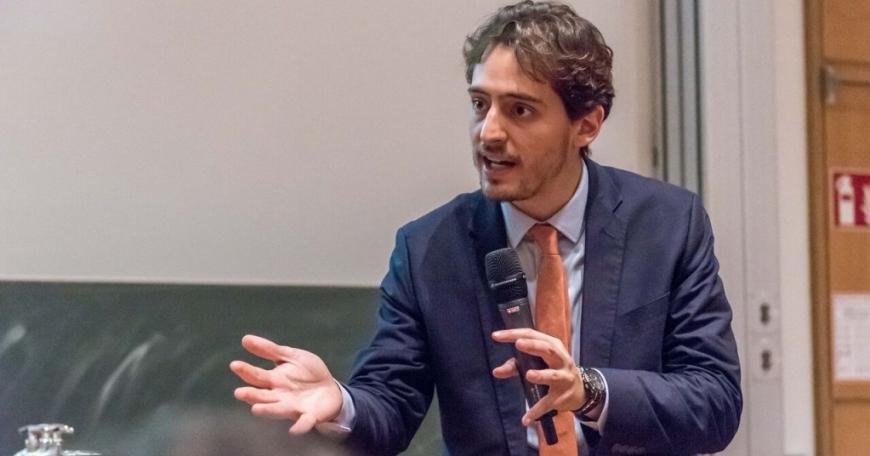Video Assessments in 11.011 & 11.111/17.381J Promote Learning in an Atmosphere of Trust

In Bruno Verdini’s undergraduate courses on negotiation and leadership, at the Department of Urban Studies and Planning, assessment is based on the student’s individual and collaborative efforts, monitored and manifested in identifying blind spots, testing new strategies, and embracing growth.
One of the fundamental ways this is nurtured is through weekly video highlights of professional negotiation exercises for collaborative viewing, examination, and reflection.
Dr. Verdini, following on the footsteps of his beloved mentors in the field, weekly engages his classes in role-playing negotiation simulations1 where students are empowered to adopt, with nuance and detailed data, the objectives and perspectives of specific stakeholders in real world cases. The students are tasked with working out whether to seek a mutually agreed accord among multiple parties with competing agendas, interests, and values.
So that every student can have full agency, Verdini, in tandem with his talented group of undergraduate TAs (who, on average, have individually completed at least 120 hours of training in negotiation), weekly structure the class into small groups, with each group executing the same negotiation exercise.
The groups are then placed in separate spaces and rooms across campus, and both the process and the nuanced results of their negotiations are captured in a series of surveys, tables, charts, and detailed visuals. This is meant to allow students to explore both the sequence and impacts of their actions, and realize the frequency with which equally talented professionals exposed to the very same information, can reach significantly different accords.
When the class meets as a whole, Verdini allows the students to review their negotiation performance against the backdrop of the performance of professionals cast in the very same role, through detailed video highlights filmed and edited by Dr. Verdini. Seeing strangers working through the same exercise that they have just done, gives the students the opportunity to learn and discuss without having to negatively criticize the efforts of anyone in their class. Learning, therefore, happens in an atmosphere of trust and confidence, where honesty, openness, and hard work is expected but where student morale remains high.
Towards the latter part of the term, once every month, the live filming of the students’ own negotiations begins. The rooms are set up with an iPad and microphone, set to videotape the group. The resulting videotape from each group’s exercise is then posted in Dropbox, but only for that group to see.
This means students can evaluate themselves and their fellow group members, with a specific focus on body language, fully aware of the context and dynamics that marked their specific negotiations. Watching the video of their negotiation allows students to reflect on their performance and that of their fellow group members in order to learn what worked, what didn’t, and how to improve. This is further discussed both collectively, in aforementioned class debriefs, and individually, in weekly journals, where each student reflects upon what worked well and why, and what they would want to do differently, from an analytical, psychological, emotional, and strategic standpoint.
Another technique Verdini uses to fully engage his outstanding students, is to carefully assign pre-class and post-class readings which are intricately connected to the week’s exercise. Students realize from the get-go that they will be under-prepared for creative decision-making and effective negotiation performance, if they have not thoroughly examined their negotiation playbook in the days preceding and ensuing the exercises. While some professors ‘flip’ their course with assigning pre-class videos to view, Verdini ‘flips’ his course with class readings that allow students to put theory to practice.
The filming and editing of the pedagogy videos requires the faculty to lead the process, directly creating highlights and captions associated with the specific themes. This implies a significant upfront faculty investment, including carefully designing the syllabus and structuring the weekly exercises, so that they build upon one another. But once developed, the videos become a unique tool to foster lively, rewarding conversations, as their conceptual and strategic value remains constant over time.
Dr. Verdini conveys his hope, in the near future, to add a set of innovative wrinkles to the subjects’ pedagogical repertoire, such as involving professional filming crews in the development of more tools to empower students with even more granular insights from their very own negotiations. “Specific close-ups and thematic highlight reels, as well as examples of carefully executed strategies by real life experts, with commentaries, as in a documentaries, along with companion podcasts and easily accessible one-on-one coaching scenarios.” As he summarizes, “the very best athletes in the world, they learn how to improve their practice by examining ‘the tape’ on a weekly basis, as it provides a unique vantage point to honestly test our actions, identify what’s wrong, and learn what to emulate.”
Verdini’s approach to pedagogy has had a tremendous impact. Student response has been overwhelming, with the highly ranked electives receiving more than 600 pre-registered students per year, from over 20 different departments, for less than 20% of available roster spots. “It was one of the best classes I took at MIT,” recent MIT alum Marol Escajeda says. “11.011 was by far the most relevant class for what I’m doing now,” says Matthew Basile, MIT ’17.2
1. http://news.mit.edu/2017/class-negotiation-skills-1103.
2. ibid.

